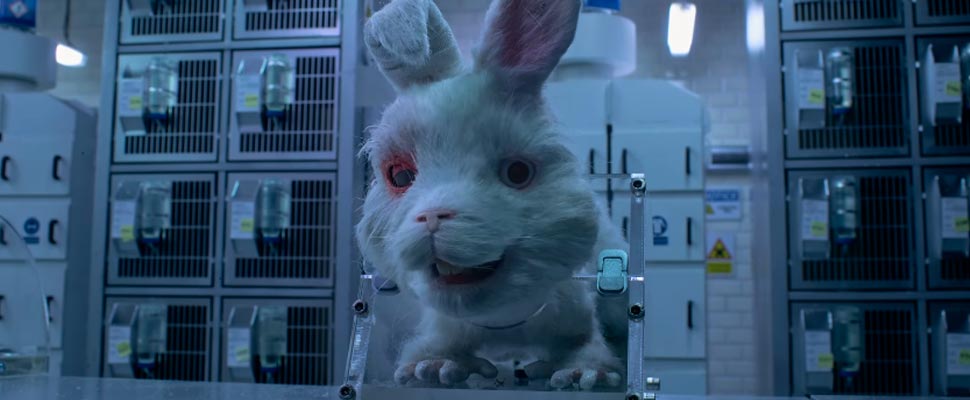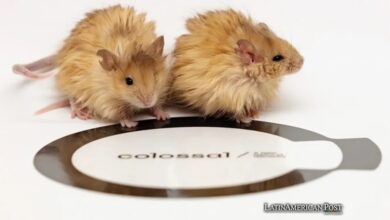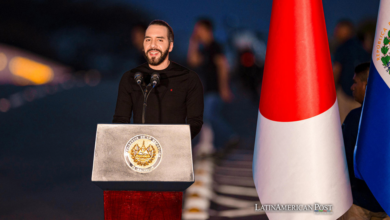Save Ralph: This is how animal testing works in Latin America
The Save Ralph campaign shocked on social networks, but what is behind it and how does it affect Latin America? .

The campaign against animal abuse and testing went viral. Photo: YT-The Human Society of the United States
LatinAmerican Post | Vanesa López Romero
Escucha este artículo
Leer en español: Save Ralph: This is how animal testing works in Latin America
Last Monday, April 12, a white rabbit went viral around the world, flooding all social networks. It was the story of Ralph, a humanized rabbit who serves as a test animal in a beauty company. The resigned animal who is also blind and deaf on the right side, apparently feels proud of his situation because, in his words, being a test animal is what all his past generations have dedicated themselves to and what his generations will dedicate themselves to come . After telling us a bit about his life, a giant hand appears, takes him and locks him in a metal box that leaves him immobilized from neck to tail. Then, other rabbits appear that, unlike Ralph, beg to be taken out of there. We finally see Ralph again, this time completely blind and with an impressive wound on his back. He leaves the camera and reads " No animal should suffer and die in the name of beauty ."
Also read: What is the relationship between zoonotic diseases and animal exploitation?
This video called Save Ralph was published on April 8 and was launched as a campaign by the Humane Society International (HSI) to popularize a problem that, until now, had been addressed legislatively in different parts of the world , but have not had an Impact on the Public: Animal Testing in the Beauty Industry.
The HSI is a non-profit organization that aims to address inhumane conditions and practices in animals in different areas: such as companion animals, farms that consume animals and animal derivatives, the illegal trade in wildlife, threats to endangered animals, animals that are used for research and tests, the murder of marine mammals, those that are used for skins in the textile industry , among others.
Is there some kind of ban around the world?
Although the value of this video lies in the fact that the topic of conversation was put on the table of consumers, the information that has been around since its boom in social networks is very confusing, since the laws that exist on this subject are different from throughout the world.
First, it must be clarified that animal tests became popular at the beginning of the 20th century, which is why they have been carried out for more than 100 years . According to animal protection organizations such as Peta, each year more than 500,000 animals die in cosmetic laboratories. It should be noted that we are talking about the cosmetic industry, but animal testing is also practiced in the pharmaceutical industry and cleaning products. On the other hand, so far and as a result of other movements and campaigns, today there are more than 40 countries that have prohibited experimentation on animals. Likewise, more than 1,000 companies now have the "cruelty free" seal that serves to designate products that are free of animal cruelty in their production.
In 2013 , the European Union banned the sale and advertising of ingredients for cosmetics and cosmetics that have been tested on animals. As it is a commercial ban, any product of this type that is sold in the territory of the EU, even if it is from another country, must comply with not being tested on animals. Some of the other countries that have adopted these bans are: India, Taiwan, South Korea, New Zealand, Turkey, Israel, and Australia . Likewise, China is advancing in a regulation for this practice.
In the case of the United States, there is no legislation that prohibits neither the importation nor the production of products tested on animals.
How are we doing in Latin America?
In the case of Latin America, Colombia is the first country to ban animal tests of any kind thanks to Law 2047 of August 10, 2020 , a regulation that will come into force in four years and will veto both experimentation within the country, as well as the export, import, manufacture and marketing of cosmetic products that test on animals. Although this achievement is very recent, it is a evidence of hope for the region to be closer and closer to taking action against this practice.
In Guatemala since 2017 experimentation is prohibited, but not importation . Mexico approved the ban but it has not been legislated because a step is missing in the process before the Chamber of Deputies. Brazil has it prohibited in 26 states but there is no specific national project. Chile has had a project since 2016 but it has not taken effect since not even the first process has been completed. As for Argentina, in 2017 a project was presented that is progressing.
The Save Ralph campaign has definitely managed to put this issue on the lips of those who can demand and pressure governments to permanently ban this practice in the countries: consumers. From it, people are paying more attention to the beauty and personal care products they consume. This is where the value of this campaign lies.




